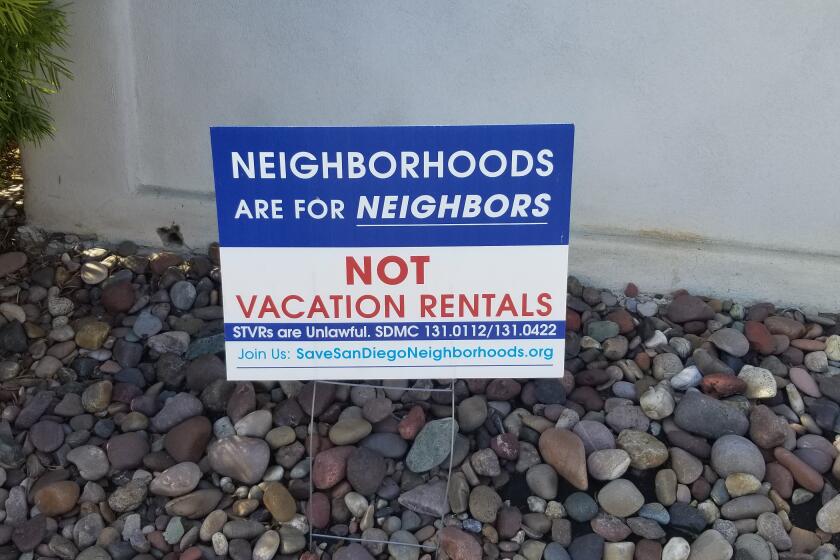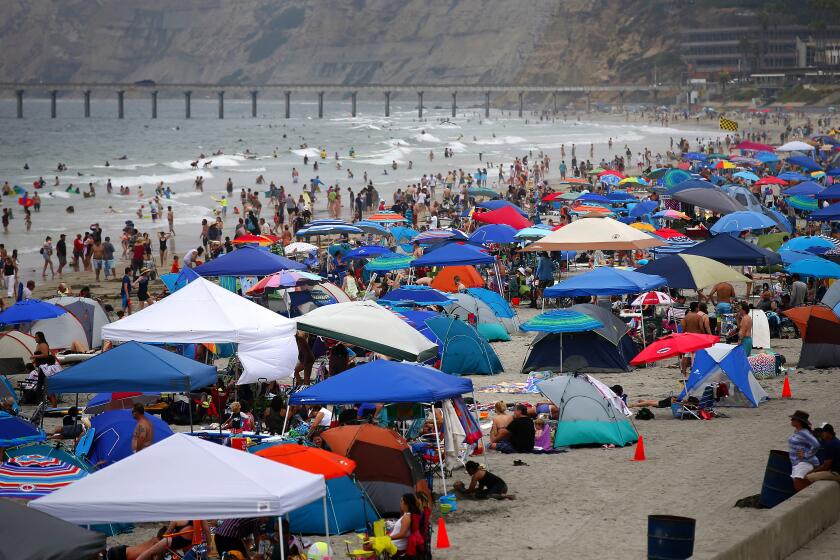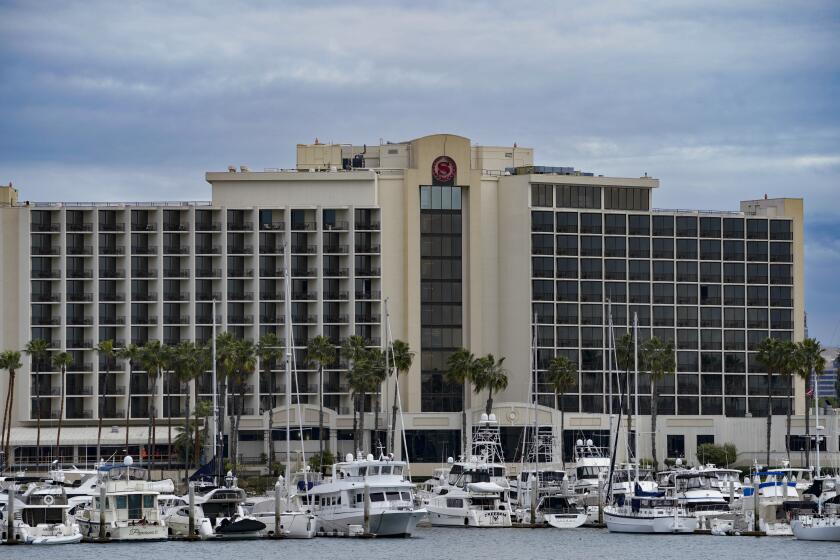Mayor proposes Airbnb regs allowing up to two rentals per host, with no limits in Mission Beach

San Diego Mayor Kevin Faulconer is proposing that short-term rentals marketed on online platforms like Airbnb be restricted to no more than two per host citywide, except in Mission Beach where there would be no limits.
San Diego Mayor Kevin Faulconer is proposing that short-term rentals marketed on online platforms like Airbnb be restricted to no more than two per host citywide, except in Mission Beach, where there would be no limits.
Under a set of regulations that Faulconer’s office will publicly unveil Thursday morning, vacation rental hosts would be allowed to rent out their entire primary residence while they are not present for up to six months a year — plus one additional home with no limitation on the number of days annually.
Opinion: Airbnb-style rentals: Neighborhoods suffer under San Diego mayor’s plan
The proposed regulations, which also call for an annual licensing fee and would impose three-night minimum stays in San Diego’s coastal areas and downtown, represent Faulconer’s attempt to bring consensus to an issue that has divided the city for years.
The mayor’s office intervened late last year after a compromise plan that many expected would gain majority support on the council fell apart amid disagreements over exactly who would be allowed to rent out entire homes on a short-term basis.
The council has held multiple hours-long hearings on the issue over the last three years but each time has struggled to reach agreement amid growing pressure to clamp down on vacation rentals in neighborhoods throughout the city.
Although the City Attorney’s Office has concluded that rentals for periods of less than 30 days are illegal under San Diego’s municipal code, it is not being enforced.
Faulconer, whose office has met over the past several months with multiple stakeholders on both sides of the debate, is hopeful his compromise plan will be favored by a majority of the council.
“This is a balanced approach that establishes clear rules of the road for short term rentals and protects neighborhood quality of life through increased oversight and enforcement,” Faulconer said in a statement Wednesday. “This is a fair compromise that allows the home-sharing economy and our neighborhoods to coexist and gives everyone clarity moving forward.”
Specific ordinance language has not yet been released, but the mayor’s office has set July 16 as the date for a full City Council hearing. Under his proposal, the licensing regulations would not become effective until Jan. 1, 2020, to give vacation rental hosts time to adjust to the new rules. The regulations also would have to pass muster with the California Coastal Commission, which has purview over the beach-area communities.
The city has created a special page on its website with details on the proposal and an interactive map identifying the coastal and downtown areas where a three-night stay would be required.
As part of Faulconer’s proposal, an annual licensing fee of $949 would be charged for each home rented out for less than 30 days to help generate revenues to hire up to 16 new code enforcement positions. That includes five such positions that were just approved in the city’s new fiscal-year budget, explained Elyse Lowe, the mayor’s director of land use and economic development policy.
While the annual fee would apply to all whole-home rentals citywide, including those in Mission Beach, there would be no restriction on the number of licenses issued in the popular beach community.
In its decision to carve out Mission Beach as an exception, the mayor’s office argues that the community is a primary contributor to San Diego’s tourism economy but has few hotels within Mission Beach proper, Lowe said. However, there are a number of hotels in the greater Mission Bay area.
Noting that Mission Beach has a long history of vacation rentals, Lowe said an analysis of the community’s 2,400 property owners revealed that more than 1,000 own two or more units.
“In accordance with the Coastal Commission’s approach of ensuring low-cost visitor accommodations, we’ve decided to be more permissive in Mission Beach so it is not exclusive to wealthier people,” Lowe said.
That does not sit well with Gary Wonacott, president of the Mission Beach Town Council, who said he was “very disappointed” that his community was excluded from any restrictions.
“I know there are some residents in Mission Beach who have maybe five or 10 rentals, but that’s a real small minority to allow an ordinance of this type to go through with no limits,” said Wonacutt, who was briefed on the proposal.
“It’s almost like you’re changing the zoning to commercial and making (Mission Beach) into a big hotel. Why not build more hotels in the commercial zones?”
Faulconer’s proposal does call for strict enforcement of regulations, including a “three strikes” policy that could include revocation of licenses for multiple violations of noise, nuisance and other rules governing the rentals.
The latest attempt at a compromise plan comes as more cities are clamping down on rentals popularized by Airbnb, VRBO and other home-sharing platforms. Last month, the Los Angeles City Council backed a set of proposed rules that would allow residents to host nightly rentals only in their own homes.
And the city of Boston just this week passed new regulations aimed at reining in short-term rentals by investors.
The latest proposal is likely to face opposition from some council members, most notably those representing the city’s beach communities who have pressed for rules limiting such rentals to primary residences only.
Councilwoman Barbara Bry, whose district includes La Jolla, said Wednesday her position has not changed.
“I am still supportive of unlimited home sharing in your own home and up to 90 days a year whole-home rental of your primary residence, which is what San Francisco enacted and what other major cities are going to be doing because they realize the importance of preserving their housing stock,” Bry said.
Councilman Chris Cate, who has taken a more permissive approach to Airbnb-style rentals, said there was much to like about elements of Faulconer’s proposal but he was not prepared to say whether he can support it.
“From a starting point, this is a good position to be in as opposed to the Bry proposal where we couldn’t have anyone participating who owned a home and doesn’t live in the city, which is a de facto ban,” said Cate. “With this proposal, the mayor has an understanding of the amount of dollars that flow to the city from short-term rentals, which have been in the community for a number of years.”
Airbnb declined to comment Wednesday on Faulconer’s proposals, saying only that it supports “fair and reasonable regulations that reflect the tremendous benefits short term rentals bring to San Diego and its host community.”
The Short-Term Vacation Rental Working Group, a coalition of town council and community leaders from across San Diego, had a mixed reaction to the proposal from the mayor’s office.
La Jolla Town Council president Ann Kerr Bache, who heads the working group, said it favors limiting vacation rentals to primary residences only.
Although the group appreciated the willingness of the mayor’s office to listen to its concerns, Kerr Bache called the proposal “a giveaway to Airbnb.”
The city of San Diego conservatively estimates that there are 3,600 vacation rentals, including those where hosts rent out a room in their home. Last year, the city collected $19 million in transient occupancy taxes from all kinds of short-term rentals.
Faulconer’s proposed rules would allow unlimited home sharing where the host is present and would not require the payment of a licensing fee. For homes with five or more bedrooms, a more costly, rigorous review would be required.
In San Diego, residents in single-family neighborhoods have long complained that rotating cycles of vacationers disrupt their once-quiet streets and deplete the city’s stock of long-term rental housing. On the flip side, vacation rental hosts say that platforms like Airbnb and HomeAway provide them extra revenue to help meet their financial obligations.
In a move to address some council members’ concerns about the potential impact of short-term rentals on affordable housing, the mayor’s office hired an outside firm to determine whether there is such a connection. It concluded there was and recommends a nightly affordable housing fee of $2.76, Lowe said.
__________________________________________
Proposed short-term rental regulations
- Up to two whole-home rentals per host, including primary residence
- Primary residence can be rented out for up to six months per year
- Secondary residence can be rented year-round for short-term stays
- Minimum three-night stay for whole-home rentals in coastal areas and downtown San Diego.
- Registration with the city required, along with annual $949 fee per rental
- Unlimited short-term rentals in Mission Beach
- Affordable housing fee of $2.76 per night.
Business
lori.weisberg@sduniontribune.com
(619) 293-2251
Twitter: @loriweisberg
Get U-T Business in your inbox on Mondays
Get ready for your week with the week’s top business stories from San Diego and California, in your inbox Monday mornings.
You may occasionally receive promotional content from the San Diego Union-Tribune.













